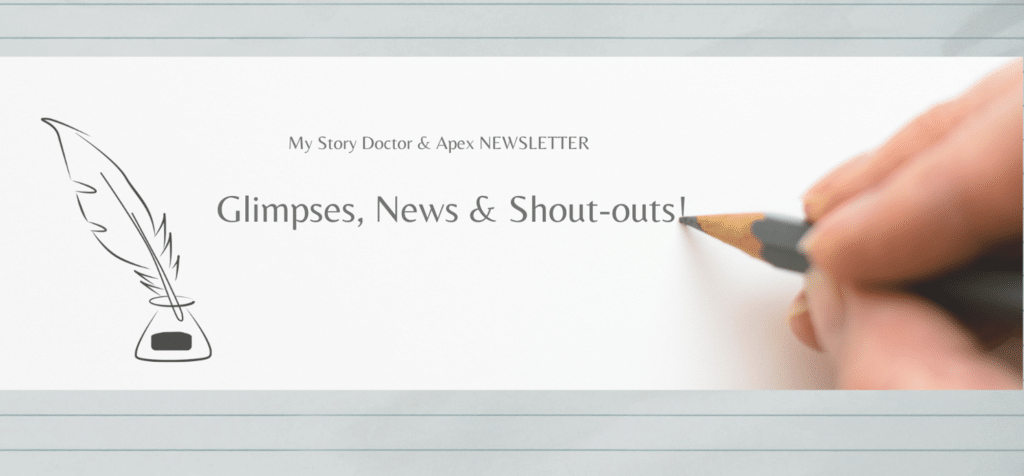Use this checklist for writing your story, and you will write even stronger stories. David Farland was a best-selling author and contest judge for the world’s largest short story competition.
When I used to write for competitions, I would make lists of ways that judges might look at my work in order to grade it. For example, some judges might look for an ending that brought them to tears, while another might be more interested in an intellectual feast. A couple of you asked what my list might look like.
So Here Is a Checklist of Things That I Might Consider in Creating a Story.
First, a word of warning. When I was very young, perhaps four, I remember seeing a little robot in a store, with flashing lights and wheels that made it move. To me it seemed magical, nearly alive. My parents bought it for me for at Christmas, and a few weeks later it malfunctioned, so I took a hammer to it and pulled out the pieces to see what made it work—a battery, a tiny motor, some small colored lights, cheap paint and stickers.
Your story should be more than the sum of its parts. It should feel magical, alive.
But when we go through a checklist like this, we’re looking at the parts and not the whole. When you’re composing your story and editing it, you must be constantly aware of the whole story, keeping it in mind, even as you examine it in detail, making sure that one part doesn’t overbalance another.

1. Setting
My goal with my settings is to transport the reader into my world—not just through the senses, but also emotionally and intellectually. I want to make them feel, keep them thinking. This can often be done by using settings that fascinate the reader, that call to them.
- Do I have unique settings that the reader will find intriguing? In short, is there something that makes my setting different from anything the reader has seen before?
- If my setting is in our world, is it “sexy” or mundane? (People are drawn to sexy settings. Even if we place a story in a McDonald’s, we need to bring it to life, make it enjoyable.)
- Do I have any scenes that might be more interesting if the setting were moved elsewhere? (For example, let’s say that I want to show that a king is warlike. Do I open with him speaking to his counselors at a feast, or on the battlefield?)
- Do I suffer by having repetitive settings? For example, if I set two scenes in the same living room, would one of them be more interesting if I moved it elsewhere?
- Do my descriptions of settings have enough detail to transport the reader?
- Did I bring my setting to life using all of the senses—sight, sound, taste, touch, smell?
- Do my character’s feelings about the setting get across?
- Do I want to show a setting in the past, present, and suggest a future? (For example, I might talk about a college’s historical growth and importance, etc.)
- Can a setting be strengthened by describing what it is not?
- Does my setting resonate with others within its genre?
- Do my settings have duality—a sometimes ambiguous nature? (For example, my character might love the church where she was married, have fond memories of it, and yet feel a sense of betrayal because her marriage eventually turned ugly. So the setting becomes bittersweet.)
- Do my settings create potential conflicts in and of themselves? (If I have a prairie with tall grass and wildfires are a threat, should I have a wildfire in the tale?)
- Do my characters and my societies grow out of my setting? (If I’ve got a historical setting, do my characters have occupations and attitudes consistent with the milieu? Beyond that, with every society there is almost always a counter-movement. Do I deal with those?)
- Is my setting, my world, in danger? Do I want it to be?
- Does my world have a life of its own? (For example, if I create a fantasy village, does it have a history, a character of its own? Do I need to create a cast for the village—a mayor, teacher, etc.?)
- Is my setting logically consistent? (For example, let’s say that I have a merchant town. Where would a merchant town most likely be? On a trade route or port—quite possibly at the junction of the two. So I need to consider how fully I’ve developed the world.)
- Is my setting fully realized?
(Let’s say I have a forest. What kinds of trees and plants would be in that forest? What kind of animals? What’s the history of that forest? When did it last have rain or snow? What’s unique about that forest? Etc.) - Does my setting intrude into every scene, so that my reader is always grounded?
(If I were to set my story in a field, for example, and I have men preparing for battle, I might want to have a lord look up and notice that buzzards are flapping up out of the oaks in the distance, already gathering for the feast. I might want to mention the sun warming my protagonist’s armor, the flies buzzing about his horse’s ears, and so on—all while he is holding an important conversation. - Are there any settings that have symbolic import, whose meanings need to be brought to the forefront?

2. Characters
I want my characters to feel like real people, fully developed. Many stories suffer because the characters are bland or cliché or are just underdeveloped. We want to move beyond stereotypes, create characters that our readers will feel for. At the same time, we don’t want to get stuck in the weeds. We don’t want so much detail that the character feels overburdened and the writing gets sluggish.
So here are some of the checkpoints I might use for characters.
- Do I have all of the characters that I need to tell the story, or is someone missing? (For example, would the story be stronger if I had a guide, a sidekick, a love interest, a contagonist, hecklers, etc.?)
- Do I have any characters that can be deleted to good effect?
- Do I have characters who can perhaps be combined with others? For example, let’s say I have two cops on the beat. Would it work just as well with only one cop?
- Do my characters have real personalities, depth?
- Do my characters come off as stock characters, or as real people?
- Do I know my characters’ history, attitudes, and dress?
- Does each character have his or her interesting way of seeing the world?
- Does each character have his or her own voice, his own way of expressing himself?
- Are my characters different enough from each other so that they’re easily distinguished? Do their differences generate conflict? Remember that even good friends can have different personalities.
- Have I properly created my characters’ bodies—described such things as hands, feet, faces, hair, ears, and so on?
- Do each of my characters have their own idiosyncrasies?
- Do I need to “tag” any characters so that readers will remember them easily—for example, by giving a character a limp, or red hair, or having one who hums a great deal?
- How do my characters relate to the societies from which they sprang? In short, are they consistent with their own culture in some ways? And in what ways do they oppose their culture?
- What does each of my characters want?
- What does each one fear?
- What things might my character be trying to hide?
- What is each character’s history? (Where were they born? Schooled, etc.?)
- What is my characters’ stance on religion, politics, etc.?
- How do my characters relate to one another? How do they perceive one another? Are their perceptions accurate, or jaded?
- Does each character have a growth arc? If they don’t, should they?
- How honest are my characters—with themselves and with others? Should my readers trust them?
- What would my characters like to change about themselves? Do they try to change?
- Do my characters have their own family histories, their own social problems, their own medical histories, their own attitudes? Do we need a flashback anywhere to establish such things?

3. Conflicts
One of the surest ways to engage our audience is through our conflicts. When a conflict is unresolved, and when the audience is waiting breathlessly for its outcome, the reader’s interest will become keen. They’ll look forward to the resolution unconsciously, and may even be thinking, “Oh, this is going to be good!” That state of arousal is called “suspense,” and it’s perhaps the most potent element of a tale.
- What is the major conflict in my story?
- Do I have proper try/fail cycles for it?
- Is the major conflict resolved?
- Is it universal enough so that the readers will find it interesting? (Note that a conflict becomes far more interesting to a reader if it is something that he must deal with in his own life.)
- Have I brought it to life through the incidents that I relate? In other words, are there ways to deepen or broaden the main conflict?
- Do I have secondary conflicts? Most stories require more than one conflict. For example, a protagonist will often have an internal conflict as well as an external conflict. He may also have a love interest. He might have conflicts with nature, with God, and with his companions. So as an author, I must create a host of conflicts and decide how each one grows and is resolved.
- How do my characters grow and change in order to overcome the conflicts?
- Do my characters perhaps decide to adapt to a conflict, struggle to live with it rather than beat it?
- How ingenious are my character’s attempts to solve their problems? Ingenuity often adds interest.
- How driven are my characters to resolve their conflicts? Characters who will go to extremes are needed.
- Do I have any namby-pamby attempts that I should delete? For example, if I have a protagonist whose main problem is that she doesn’t have the nerve to talk to her boss about a problem at work, should I strike that entire try/fail cycle? (The answer is, almost always you should strike out the scenes and replace it with something better.)
- Is my hero equal to or greater than his task at the start of a tale? If so, then my hero needs to be weakened so that we have a better balance.
- Does my protagonist ever get betrayed?
- Does my protagonist have an identity conflict? At the heart of every great story is a character who sees himself as being one thing—charming, heroic, wise—while others around him perceive him as being something else—socially wanting, inept, fool.
- Do I have enough conflicts to keep the story interesting?
- Should some of the minor conflicts be deleted, or resolved? (Remember that not all conflicts need to have try/fail cycles.)

4. Theme
Themes in the story might be called the underlying philosophical arguments in your tale. A story doesn’t need to have a theme in order for it to be engaging. Likeable protagonists undergoing engaging conflicts is all that you need in order to hold a reader. But a tale that tackles a powerful theme will tend to linger with you much longer. Indeed, such tales can even change the way that a reader thinks, persuade him in important arguments. Shakespeare made every story an argument, and the “theme” was the central question to his tale.
Some people will suggest that dealing with themes is “didactic.” Don’t be fooled. Those same writers will put themes in their own works, and usually they’re taking stands that oppose yours. For example, if you argue that morality is innate and central to what a human is, they’ll argue that it’s situational and we’re all just animals. They don’t oppose the idea of stories having themes; they may just be opposed to your views. So make sure that your arguments are rigorous and persuasive.
- Can I identify themes that I consciously handled?
- Are there themes that came out inadvertently?
- How universal are my themes? How important are they to the average reader?
- Are there themes that need to be dealt with but aren’t? For example, if I have a policeman who is going to take a life, does he need to consider how he will feel about that?
- Are there questions posed or problems manifested that bog the story down and need to be pulled?
- Do my characters ever consciously consider or talk about the main themes? Should they?
- Do my characters need to grapple with important questions? If not, perhaps they should.
- Do my characters change at all due to the influence of new ideas or beliefs?
- If my theme is going to “grow,” become more important as the story progresses, do I need to add or modify scenes in order to accommodate that growth? In other words, do I need to let the theme help shape the tale?
- As your character grapples with a theme, does he find himself led down false roads? For example, let’s go back to our cop. Let’s say that he shoots a boy at night, and feels guilty when he discovers that the boy wasn’t really armed. What the cop thought was a gun turns out to have been a cell phone. Would other characters try to influence him? Perhaps a senior officer might take him out to get a drink—because alcohol has been his salvation for 20 years. Another officer might suggest that the kid was trying to commit suicide by cop, and that our protagonist “did the kid a favor,” and so on.
- Does my character ever have to synthesize a thematic concept—come to grips with it intellectually and emotionally, so that it alters the character’s behavior?

5. Treatment
There are five elements that will come into nearly every scene in your story—setting, character, conflict, theme, and treatment. Your “treatment” is the way that you handle your story. The number of items that come into play in your treatment is so long, I can’t get into all of them. We could get down to the real nitty-gritty of putting a sentence together.
You’ll want to create your own list of items to look for in your treatment. If you notice for example that you’re creating a lot of long, compound sentences in a row, you might make it a goal to vary your sentence length. You find that you’re using weak verbs, you may want to go through your tale and search for instances of “was” and “were.” If you find yourself using the word “then,” you might want to go through in your edits and make sure that incidents in your tale are related in sequential order, so that you don’t need the word “then.” You find yourself stacking modifiers in front of nouns and verbs, you might want to watch for that in your editing. If you tend to over-describe things, you might want to watch your descriptions.
In short, whatever your own personal weaknesses are in writing, you’ll want to create a list so that you can think about them when you write.
But here are a few elements to consider in your treatment.
- Is your tone appropriate to the tale? For example, let’s say that you want to invest a bit of humor into your story. You start it with a joke. Do you maintain the tone throughout the rest of the tale, perhaps layering the humor in, scene after scene?
- Do each of your characters speak with their own unique voices? You’ll need to do a dialog check for each character before you’re done.
- Do you as a narrator establish a voice for the piece, one that you maintain throughout?
- Is every description succinct and evocative?
- Do your descriptions echo the emotional tone of the point-of-view (POV) character?
- Do you get deep enough into your protagonist’s POV so that the reader can track their thoughts and emotions? If not, is there a good reason why you neglected to do so?
- Is there music in your language? Do you want there to be? Ernest Hemingway once said that “All great novels are really just poetry.” With that in mind, listen to the sounds of your words. Consider changing them as needed to fit the meter and emphasis that you need.
- Do you use enough hooks to keep your reader interested?
- Could you strengthen the piece by using foreshadowing?
- Do you use powerful metaphors or similes to add beauty and resonance to your work? (If not, you’re in trouble. Your competition will.)

6. Story Parts
Sometimes when you’re looking at a story, you need to think about it in “chunks.” Here are a few things that I think about when creating a tale.
- Is the basic idea of your story original and powerful? (In a contest, entering a story with a mundane concept probably won’t get you far. For example, if you enter a story about a young man fighting space pirates, it probably won’t do well—unless you come up with some new technology or angle that sets it above all other space-pirate tales.)
- Do you establish your characters swiftly? We should probably know whom the story is about within a scene or two, and we should probably be introduced in a way that tells us something important about the characters.
- We also need to establish the setting in every single scene.
- Do you get to the inciting incident quickly and cleanly?
- Are there any storytelling tools that I could use to make this tale better. (For a discussion of storytelling tools, see my book Million Dollar Outlines)
- Does my story escalate through the following scenes, with conflicts that broaden and deepen?
- Does my story resolve well? Do I have a climax that really is exciting? Is the outcome different from what the audience expects?
- Do I tackle all of the resolutions in a way that leaves the reader satisfied?
Writing a story can be an exhausting exercise—intellectually challenging and emotionally draining. When you’re in the throes of it, it may seem daunting. But you’re never really done until the outcome feels magical, and if you take care of all the little things that you should, the outcome will indeed seem wondrous.
Happy writing!
Previously Published
***

📌 The Scoop about LAST week on
Apex’s Strategy and Mastermind
The week of March 20, Apexers got to:
- Take a look inside Parisian Phoenix Publication
- Be spellbound with Lisa Cron’s Wired with Story and how we can use brain science to create unforgettable and powerful story.
- Be overwhelmed and excited at all the marketing opportunities we can select from with Marketing for Introverts and Extrovert with Pattie Giordani & Tina Gallagher.
STRATEGY 3/20/2023 – Parisian Phoenix Publication highlights
Angel Ackerman, along with some of her staff, Nancy Scott, editor, and Gayle Hendricks, art director, gave us a look-see on the origin story behind their relatively new publishing house, Parisian Phoenix Publishing House. Their first book, Manipulations: Book One penned by Angel was published in September 2021 after deciding to go it alone instead of a traditional route. This decision spun out to include Gayle Hendricks, art director, and Nancy Scott, editor and a few others in the Lehigh Valley, Pennsylvania. They currently have eleven books in their collection in the eighteen months of their conception.
Their “Parisian Phoenix” stems from Angel’s love of French language, literature and history combined with the idea that it’s never too late to rebuild oneself. And their vision is Sharing Unique Voices and Diverse Perspectives. Their goal is to allow as many authors as possible to be able to express their vision with quality in a product that Parisian Phoenix can be proud of. Angel considers her company as a craft boutique publisher.
In addition to the books published under Parisian Phoenix Publishing, Angel and her team have helped other self-published authors in whatever capacity that they need.
Questions that were fielded included typeface for both the inside of the a book and for it’s cover. Gayle went into how different topography and images create certain moods and how she decides on what is right for the book when designing the cover and the book interior. She talked about transitional serif have a larger ‘x’ height that makes it easier to read and that it has a nice contrast thick and thin when the lettering is curving. Gayle said is very open to people reaching out to ask her questions…which all the ladies did.
According to Angel, being able to establish dialogue in the writing community and creating connections is one of the most important things. She is also floating an idea about doing an anthology for the modern day Frankenstein.
If you’d like to learn more about Parisian Phoenix Publishing, join the mailing list or ask additional questions, visit ParisianPhoenix.com. You can also follow them on LinkedIn, Facebook, Instagram, Twitter, TikTok and Patreon.
MASTERMIND 3/20/23 – Lisa Cron highlights
Lisa’s presentation turned wide-stream preconceptions of what story is on its head and shone a light on the fact that storytellers are the most powerful people on the planet. Why is this? Because story is our most powerful communication tool —it’s built into the architecture of our brains. We think in story and we moved from the middle of the food chain to the top because of story.
Her presentation gives information on what the reader’s brain is hungry for, why, what a story and how to write a more powerful novel.
Boiling down to just the highlights:
- Learning how to write beautiful sentences does not make a story. In fact, we don’t read for the beautiful sentences because it will be “a perfectly-penned so-what.” It’s not what sucks us in and keeps us there. Beautiful craft technique is the handmaiden of story and story gives the technique its power.
- Story is more crucial to our evolution than our very appreciated opposable thumbs. Why? Without story we would be relegated to the state of perpetual NOW. We would not be able to step out of the present and plan for the future with all its dangers and delights. It helped us with our evolution to give us the information to keep us surviving through the night.
Or to put it in another way, Story tells us what to hang on to. We are uncomfortable, even afraid of what we do not know —hence the term ‘the devil we know.’ We seek to remain in our comfort zone not because it is comfortable — it often isn’t—but because it is what we know. What story allows us to do is to try on simulations of unknown scenarios from the safety of our armchairs.
- Story allowed us to move from the middle of the food chain to the top.
How? It gave us the tools to be able to work well with others and our combined resources are what launched us to the top.
- Story makes us feel good. Our brains create a surge dopamine when we are involved in story. This creates curiosity and a desire to learn what happens next because we might need to know it.
- We use story not facts to make sense of everything. Story allows us to navigate reality. It allows us to translate dry facts, big ideas, and abstract concepts into something specific so we can make our minds up for what to do with the facts.
If we didn’t use story, we’d have difficulty unpacking those facts and how it will affect us. Basically the information presented will just shoot over our heads.
- Story makes us feel. Contrary to Aristotle that we must use logic for decisions because your emotional self is the “irascible scamp that will tip-toe in, cloud your judgment and you’ll make a decision that you will regret,” we use emotions to make decisions.
Without our emotions, we wouldn’t be able to make a single rational decision as feelings are the chorus of chemical reactions that the brain and nervous system translates into feelings which lets you know that decision means to you.
- Story allows us to broaden our horizons. And it allows us the opportunity to broaden the horizon of others. Due to our biology when someone attempts to give us facts on a contradictory belief which we hold dear, we balk. Our defenses go up.
Why? Because our held beliefs are part of our identity, our self-image and our brain is trying to protect us. It was dangerous to go against our “pack” or “tribe” back in the day because to be ostracized meant you were given a death sentence. We can still experience a psychological and/or social death. In fact, blood rushes to our thighs for the fight or flight when this happens. But if someone says to ask “can I tell you a story,” we lean in. Dopamine comes up and shushes our defensive part.
And what happens when we listen to a story? If told effectively, it absolutely can rewire the brain to give us more empathy because everything that is affecting a character in the story is affecting you. You feel biologically what the character is feeling and you come away feeling that we are more alike than I thought.
- So what is story and how do we do it effectively?
- Story is what happens that affects someone in pursuit of a deceptively difficult goal and how that person changes internally – something in their belief system shifts in order for them to solve the problem or to see it as something different than what they thought it was.
- Story’s first job is to anesthetize that part of your brain that knows it’s a story. Thus allowing you to be sucked into the story world.
- Effective story telling is not a play-by-play of the character’s body reactions. In fact., other than having a protagonist trying to translate secondary characters’ body reactions, you should avoid it or keep it a minimum. Why? Because readers want to see the meaning behind the actions. We want to feel what your character is feeling or we aren’t interested.
- How do we show what our protag is feeling?
MASTERMIND 3/25/23 3/18/23 – Pattie Giordani & Tina Gallagher highlights
Pattie and Tina gave us tons of ideas of how to market based cheekily on the introverted style and the extroverted style and encouraged all to pick and chose what appeals. These ideas included:
Marketing for Introverts (Tina) :
- A good way to look at marketing is that it is just a conversation between you and your reader. Focus on the ideal reader. Start simple.
- Have a Author website to establish your brand because this will be your home base. Have everything else tie to your website. This you own. If other sites go down, people can still find you on your website.
- Have a newsletter. You own your subscription list. You can do analytics to see what posts are working and which ones aren’t. And, the people who sign up are your fans making these warm contacts.
- Join the conversation on social media: Join genre best Facebook groups. Show up as a person. Start small like liking posts, writing comments, and leveling up to making your own post when you feel comfortable.
- Like Author Facebook pages.
- Join genre-themed Facebook groups**.** These a great places to see what readers are saying. You can build relationships with fans of the genre. Show up as a fellow fan of the genre, not a salesperson.
- Join Facebook groups for authors. These are great places to get to know other authors in your genre and form relationships. You have the opportunity after you get to know the people better, to join forces with other authors to do group promotions. Plus, you can ask book-related questions and will often get answers from multiple authors. Tina recommends:
- You can do the same on Instagram and TikTok. Follow authors and hashtags.
- Consider Youtube. You can a video (and edited the footage before posting) about:
- A book trailer
- A video of a someone interviewing you
- A video of you talking about something you learned while researching for your book
- A video detailing what inspired your latest book idea
- Consider podcasts. Hosts often promote their podcasts on social media. You can message them, tell them a little bit about yourself, and ask if they think you’d be a good fit for their podcast. The worst they can do is say no or ignore you.
MatchMaker.fm, which is a free online platform that connects podcasters with guests. Consider creative ways the main genre or subject of your book could fit after you make contact. Tell them what you can bring to a podcast.
- Swag
- Paid Ads
- Put a link to your next book, your newsletter, ask for a review, etc. at the end of your book. Great time to catch your readers just as they are finishing reading your your book.
Marketing for Extroverts (Pattie) :
- Get covered by the media.
- Consider writing press releases. In the past authors had press kits, items are now digital: Author biography, headshot, book info/excerpt, blurb, reviews.
- Content for a press release: answer some of the five Ws and how —who, what, where, when, why. Make sure the information you are giving is newsworthy such as launching a book, having a speaking engagement, being given an award. Allow enough lead time: 2-3 weeks for newspapers. 2-3 months for magazines.
- Media Outlets List: Newspapers, magazines, newsletters, websites, blogs, and TV and radio stations. Compile your media list with contact info and keep it updated.
- Press Release Writing – Parts of a press release:
- Heading: Name and contact information, usually email address and phone number
- Headline: (example) Local Author Holds Book Signing, Local Author Publishes Second Novel
- Body: Include information from most important to least important (inverted pyramid)
- Closing: Standard information about you and your books—can be the same on most of your press releases, a very short bio and your website URL again.
- Signings/Appearances
- Set up or (apply to attend) book signings and readings at bookstores, libraries, conferences, book fairs/festivals. Pattie gave a lot of great examples of how to connect things that are applicable to you to opportunities, such as Jonathan Maberry doing a signing at a movie theater doing a zombie double-feature zombie.
- Some places provide tables. Some require you to bring your own. Buy a folding table and get a banner to display (if allowed). Offer swag and candy. Display your books creatively. You might put tags on your books to let readers know the premise. For example, in romance, tropes include second chance, opposites attract, friends to lovers, enemies to lovers, and marriage of convenience.
- Speaking engagements opportunities:
- Bookstore or library: Talk about your writing process or “where you get your ideas.” Read a short excerpt from your book or a personal essay.
- Writers at a group meeting, conference, or other event: Develop a workshop on an aspect of writing that you have expertise in, and pitch the workshop to local writers groups for a monthly meeting topic or a conference session. If you write fiction, don’t limit yourself by genre. Many aspects of writing fiction transcend genre, for example, a local writers group had poets speak on using imagery in writing.
- Community groups: Many local groups, such as the AAUW and the Rotary, feature local speakers at their meetings.
- Schools.
- Professional conferences: Is the subject matter related to your platform, story, the book’s setting, or another aspect of the book?
- Hand-selling your book – consider craft shows, holiday boutiques, pop-up events, arts festivals, street fairs, farmers markets, and community events.
- More ideas were brought up during the zoom call too. But basically how you can connect your book to opportunities to market….the ideas are near endless.
March Microfiction Madness
Finalists
4th Round Prompt
4thTraining Workshop
- Joshua Dyer and the other judges have gone through all the entries and have announced who will continue on to Round 4 – the Finals. Thank you Jen Bair, Jan Nerenberg, Danuta Raine, Mike Jack Stoumbos, and Joshua Dyer!
- The prompt for Round 4, posted earlier on the Apex-writers Facebook group, is up and our contestants have until midnight ET / 10 pm MT today, March 27, 2023 to email it before the deadline.
- Additionally, one of the opportunities from the writing tournament is to grow and learn which means we are being treated with solid info with writing and submission training written workshops. The 4th workshop article is included! STRONGLY RECOMMEND READING THE WORKSHOPS! And good luck finalists!
ROUND 3 IS COMPLETE AND THE FINALISTS HAVE BEEN NOTIFIED!
Inaugural March Microfiction finalists announced!
Congratulations to our twelve writers advancing to the inaugural March Microfiction Madness finals! In no particular order:
Jade Wildy — Jan Villaverde — Michael Wine
Scott Sands — Dina Scott —Brandon Clark
Blake Wallace — Ruth Nickle — Tammy Burke
Jenna Livingston — Maggie England — Eric Stallsworth
Join us in congratulating their win, which was quite an accomplishment in such a talented field of writers. Mere fractions of a point separated the semi-final results. That said, bring your best into the finals. The smallest of details may be the difference.
March Microfiction Madness: Fourth & Final Round!
FINALIST PROMPT (Round #4):
Genre: any of the speculative fiction categories. Dig deep. Be original.
Prompt: Life inspires art. Art inspires life. On occasion, art inspires other works of art. For the championship round, your task is to take the lyrics, mood, and music of the given song by world-renowned artist, Enya, and craft your best microfiction story from it. Same 300-word maximum. Still need a great cover letter. Your stories still require a character in a setting with a conflict. You must bring the scene/piece to a satisfying conclusion. Last but not least, proof your work for errors prior to submission. Follow submission guidelines. These may make the difference. Still due Monday night by midnight EST (USA).
As stated earlier, the results from the finals will be posted including rank and point totals.
“Exile” by Enya
Cold as the northern winds in December mornings,
Cold is the cry that rings from this far distant shore.
Winter has come to lay too close beside me.
How can I chase away all this fears deep inside?
I’ll wait the signs to come.
I’ll find a way.
I will wait the time to come.
I’ll find a way home.
My light shall be the moon
and my path – the ocean.
My guide the Morning Star
as I sail home to you.
I’ll wait the signs to come.
I’ll find a way.
I will wait the time to come.
I’ll find a way home.
Who then can warm my soul?
Who can quell my passion?
Out of these dreams abode
I will sail home to you.
Exile – Enya (lyrics) – YouTube[Editor note: prompt dropped in the Apex Facebook group as of Saturday, March 25 – reposted above. Also, in case you are not in the semi-finals, feel free to play this at home and share your microfiction writing with your story circle. ]
Rules and where to send is pinned at the top of Apex Facebook group. Or, look for #MarchMicrofictionMadness
March Microfiction Madness TRAINING WORKSHOP #4 by Joshua Dyer:
Our final workshop centers around characters. After your setting, they are the most important pieces in your stories. For your stories to be successful, you must create deep, realistic characters with whom your readers can empathize. If you fail at this, your story may fail to launch.
Things to consider in character development.
Your target audience will help you determine which characters populate your story. Readers gravitate to protagonists similar to themselves. Begin here.
Physical attributes. Having a thorough understanding of what your characters look like is integral to being able to bring them to life in your work. You should go beyond the basic driver’s license data (height, weight, eye color, etc.) and dig into the finer details. Ear and nose size. Scars and tattoos. Piercings?
Backstory. We all have a history. In addition, your characters should, too. Answer those questions. Where are they from? Who’s in their family? Relating to the questions above: where and how did they get those scars? What led them to the piercing?
Hopes and fears. Spend some time with each character to figure out what they want and dream about. What keeps them up at night? Why? What do they fear more than anything?
Intellect. How smart are they? Forrest Gump and Real Genius are both excellent films for the same reason. Explore neurodivergence. The more you understand about what makes your characters tick, the more your readers will engage with them.
Spirit. Do they have a system of beliefs? How does this influence their decision making process? Moreover How does it strengthen your character? How does it make them vulnerable?
Mind. Body. Spirit. Remember? Keep questioning your characters, and when they give you answers question those. Until next time.
#MarchMicrofictionMadness
📌 ON DECK for NEXT WEEK:
Monday’s (4/3/23 – 5:30 MT/ 7:30 pm ET) Strategy Meeting – Jason Brick – Social Media

Jason Brick is a professional writer, martial artist, travel addict, and dad whose work has been published across multiple genres and formats.
He has contributed over 3,000 articles and short stories to print magazines and online sites in topics ranging from home improvement, to health and wellness, to cocktail recipes, to small business management. Some of Jason’s top-level corporate clients include Black Belt and Thrillist magazines, American Express, Intuit, and Mint.com.
Jason has ghost-written more than 20 books and ebooks for corporate and private events. All five volumes of his Random Encounters series were simultaneously in their category top 10 on Amazon in early 2016.
He is also an accomplished speaker, and frequently travels to host workshops and deliver lectures at various writer’s conferences and festivals. Moreover, when not writing, he studies jujitsu, capoeira, and kenpo karate, cooks, travels, and spoils his delightful wife and two fine sons. He lives in Oregon.
Monday’s Mastermind, (3/27/23 at 7 pm MT/ 9pm ET ) – Daniel Schwabauer – Five Elements of Story

Daniel Schwabauer is an award-winning author, speaker, and teacher. He is the creator of The One Year Adventure Novel, Cover Story, Byline creative writing curricula, and the author of the young adult novels in The Legends of Tira-Nor series. His professional work also includes stage plays, radio scripts, short stories, newspaper columns, comic books and scripting for animated TV.
His young adult novels, Runt the Brave and Runt the Hunted, have received numerous awards, including the 2005 Ben Franklin Award and the 2008 Eric Hoffer Award. In addition, he graduated with honors from Kansas University’s Masters program in Creative Writing in 1995 under the guidance of science fiction writer James Gunn.
Saturday’s Mastermind (4/8/23 – 8 am MT / 10 am ET) – Lyn Worthen – Character Voice (aka Diving into Deep POV)
As a freelance editor, Lyn Worthen has helped indie authors polish over six million words of fiction, and her multi-author anthologies have received awards and acclaim from the League of Utah Writers, the Critters Writing Workshop, and the Horror Writers of America. She is a frequent participant in fiction workshops and conferences, both as a presenter and a student of the craft and business of publishing.
She is a self-described caffeine-to-text conversion unit, which explains how she gets so much done. To learn about her latest projects and releases, visit her at www.camdenparkpress.com
📌 PLUS, we have a great line-up coming up:
- Donald Maass, literary agent and CEO of the Donald Maass Literary Agency and author of the BREAKOUT NOVEL and THE EMOTIONAL CRAFT IN FICTION will be presenting “The Emotional Craft in Fiction” on Monday, April 10.
WANT TO SEE WHO IS ON WHEN?? Check out the links below.
Strategy at a Glance
One last thing for this post: If there is a topic you would love to have a presenter on, let us know! Serving our community and offering quality information is a huge part of what we do here at Apex.
If you are interested in finding out more about Apex, visit https://apex-writers.com/








